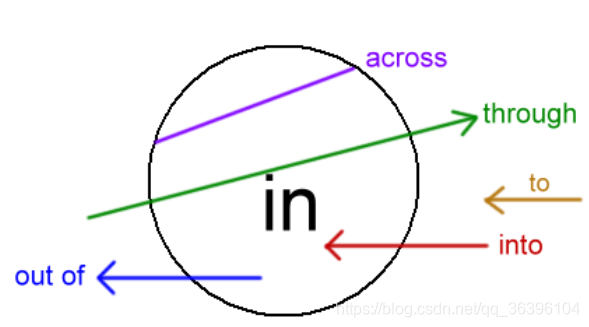by、through、via的用法及区别

1、by:在旁边,从旁边,到旁边(强调从旁边经过或路过)
关于by一词,记忆中课本上教给我们的主要有下面几个意思:
(1)附近,如nearby,pass by,go by,sit by the window等;
(2)被,如被动语态中的something is done by somebody;
(3)截止到……为止,如 Can you finish the job by 9 o'clock?
(4)乘坐,如by train/plane/water/sea/ship等。
其实呢,上面几个意思都知识by的简单化、实用化理解,不是它的意义核心。by的本义是指“(在/从/到)旁边”,也就是说:
(1)pass/go by是指从旁边经过或走过;
(2)something is done by somebody是指某事在某人身边(旁边)被做完,借指某事由某人完成;
(3)by 9 o'clock是指在9点钟附近(或左右),因为当有人问你要时间表的时候,基本上是希望你在某个时间点之前完成,如果在之后完成则说明那个时间点定得没有多大意义。
(4)by train等短语是指在火车近旁或者火车在自己近旁,借指自己在火车上。
在归纳出并抓住了by的本义之后,我们就会发现by其实并不是用来表示“经过、通过”的,它的这一意思是借用出来的,是用法所致。或者说,即便用by表示“经过、通过”的意思,也是“从旁边”经过或路过,所有的抽象用法都是由此衍生出来的。
2、thru / through:贯穿,穿过,透过,通过(强调从内部穿透)
through一词比较简单,thru是老美喜欢用的through的同音替代词(简化词),它们指的是从事物的内部穿透过去,比如说,光线透过眼镜的镜片进入我们的视网膜,河流穿过峡谷或城镇,某人闯过某片树林或丛林等等。注意:这个内部可以是完全封闭的(比如身体),也可以是部分封闭的(比如地表或峡谷),甚至可以是开放的(比如某一扇墙壁或门板)。through的核心意思是从中穿透或贯穿。
3、via:经由,途径,从某处(强调通过中间的媒介达成目的)
via一词似乎用得较少,日常生活中我们经常喜欢用by而不用via,比如要表达“发邮件”或“以邮件的方式”,基本上多数人第一个想到的就是by email,其实这时候用介词by的话,严格说起来是错误的用法,正确的做法是用via。
前面已经分析过by的本义,很明显by表示“通过某种方式或途径”的用法(如by train / by means of等)是借用或引申推广出来的,但by在表示该意思的时候有个前提:主体自己要跟随工具在一起,这是by的本义(在附近、在旁边)所决定的,或者说,主体和工具不能发生分离(这是by与via的本质区别)。
而via表达的意思是“经由某个人、某个区域、某个工具达到某个目的”,这里的“人/区域/工具”都是中间媒介,它们起着传递、连接等作用,这时候主体跟工具是注定要分离的。也就说:
(1)send someone a note via email 是指经由email的传递给某人发个便条通知某人某事情;
(2)travel from A to C via B 是指从A地出发经由B地前往C地;
(3)broadcast via satellite 是指经由(或通过)卫星进行进行广播。
【补充】也许有人会说,很多字典和词典上by也有via所表达的意思,那我只能这样跟你说:那是一些人不严格的用法,或者,是对方在不明白二者区别的情况下误用了而已(但不影响意思的理解),再或者,对方那样用是借用了by的抽象意义(不过这种解释似乎有点拧巴,包容一点的话也能接受)。
by、 through 的區別
1. through 是透過,通過某種途徑
He bought the vase through a dealer (n.).
他透過一個商人買到這花瓶。
2. by + v-ing:藉著做…,達成…目標。重點在陳述達成目標的方法。
He prepares for his finals by reviewing his notes.
他藉著/以復習他的筆記來準備他的期末考。
-He became rich through hard work (n.).
他透過努力工作而致富。
-He became rich by working hard (by v-ing).
他藉著/以努力工作而致富。
by, through, via 詳細解釋: http://tinyurl.com/kcezpd2
——————————————–
English explanation:
The word “by" is most often used, and can mean the following:
1 near someone or something; at the side of someone or something
-The telephone is by the window.
2 used to show who or what does, creates, or causes something
-He was knocked down by a bus.
3 used for showing how or in what way something is done
-The house is heated by gas.
-to travel by boat/bus/car/plane
to travel by air/land/sea
4. used to show the degree or amount of something
The bullet missed him by two inches. House prices went up by 10%.
more uses: http://oaadonline.oxfordlearnersdictionaries.com/dictionary/by
——————————————–
“Through" generally means to go from one end of something/place to the other.
1. from one end or side of something or someone to the other
-The bullet went straight through him.Her knees had gone through
-The sand ran through (= between) my fingers.
2. see, hear, etc. through something to see, hear, etc. something from the other side of an object or a substance
-I couldn’t hear their conversation through the wall.
3. past a barrier, stage, or test
-Go through this gate, and you’ll see the house on your left.
4. (also informal thru) until, and including
We’ll be in New York Tuesday through Friday.
5. by means of; because of
-You can achieve success through hard work/by working hard.
more: http://oaadonline.oxfordlearnersdictionaries.com/dictionary/through
——————————————–
“Via" emphasizes by someone or something.
1. through a place
-We flew home via Dubai.
(This use is synonymous with “through/thru."
2. by means of a particular person, system, etc.
I heard about the sale via Jane.The news program came to us via satellite.
(This use is synonymous with “by.")
source: http://oaadonline.oxfordlearnersdictionaries.com/dictionary/via
So at times, the words are interchangeable, but they all emphasize different things.
——————————————–
via VS from
via 更多的是 经由 的意思,即经过别人之手
Via: by way of; by means of; throughIf you go somewhere via a particular place, you go through that place on the way to your destination
via 某网站(某书、某渠道……)by 某人

 来宾[不是我]
来宾[不是我]